I. Five Aspects of Globalization that have profoundly Impacted Criminal Organizations
Globalization refers to the increasing link or association of different countries in terms of economy, culture, politics, technology, social and ecology. Globalization makes individuals easier to travel, communicate, to do business, and it helps people to gain access easily on the things they needed. Globalization helps businesses to operate effectively and efficiently thus giving a lot of jobs and opportunities to the people. But there are a lot of negative effects of globalization to a country or in the world. One is the proliferation of organized crime in the world putting the security of a nation in jeopardy. There are some aspects of globalization that has a huge impact on the proliferation of organized crimes in different countries. First is the increase in informational technology. It is now easy to communicate using cellular phones and internets.
You can communicate to other people all over the world. Second is the emergence of financial markets. it is now convenient for individuals to borrow or lend money from a financial company. Third is the industrial aspect. Worldwide production of goods has emerged and it is now easy for individuals to access for different kinds of goods. The fourth aspect of globalization is the cultural aspect. People nowadays somehow adopt individual’s differences in terms of culture. They are now open to different ideas and they somehow adopt or practice some cultural practices of a country. The fifth aspect of globalization is the political aspect. Nowadays some individuals or parties intervene or manipulate a country’s political system. They take charge on how to run the government or the political system of that country instead of the government officials of that country. (“Globalization”, 2007)
II. Links of Organized Crimes in the American Society
An organized crime groups in order for their organizations to flourish and proliferate, have made connections to different sectors in the society. Organized crime groups have links to the government officials making the law of the country. They bribe them with money so that the officials making the law would not make laws that would curtail the activities of their organizations or just simply not to capture them and send them to jail whenever they do illegal activities. Organized crime groups also have links to the judicial system. They buy off the judges so that in case they are caught and some criminal charges are filed against them the judge presiding the case will acquit them. They also have connections to the police officials. They also offer them money so that the police officials would let them do their illegal activities and not having them caught. They also have connections with the customs officials. They also bribe the custom officials so that they could do smuggling and trafficking of goods to different countries so that they would evade paying government taxes. Organized crimes also have linked to the business sector. They have invested in legal and illegal businesses. They invest their money in an industry whether legal or illegal that generates high profits like the tobacco industry, car trafficking, drug trafficking and other related businesses. They also invest their money in some legal businesses like the banking sector, food sectors and many others. This is what we called money laundering. They invest their money coming from illegal businesses to legal businesses. These kinds of activities conceal the real business that the organized crimes are into. That is why it is hard for the justice system and for the military and police officials to trace and capture these criminals. These are some reasons why organized crime groups continue to flourish and proliferate despite the presence of the government officials, military and police officials and judges because they are being paid off by these groups in order for them to continue their illegal activities. (Buscaglia & Dijk)
REFERENCES:
Buscaglia, E., & Dijk, J. v. Controlling Organized Crime and Corruption in the Public Sector. Retrieved March 24, 2007, from http://www.unodc.org/pdf/crime/forum/forum3_Art1.pdf
Globalization. (2007). Retrieved March 24, 2007, from http://en.wikipedia.org/wiki/Globalization#Aspects_of_globalization





